An Analysis of Entrepreneurial Ventures and Their Impact on Economy
VerifiedAdded on 2021/01/02
|17
|4998
|239
Report
AI Summary
This report provides a comprehensive analysis of entrepreneurial ventures, exploring various types such as micro, small, medium, and large businesses, along with their relationships to different typologies of entrepreneurship like scalable start-ups and social entrepreneurship. It assesses the similarities and differences between these ventures, examining their organizational goals and employee numbers. The report also interprets and assesses the economic impact of micro and macro businesses, highlighting their contributions to job creation, innovation, and overall economic development within the UK. Furthermore, it discusses the importance of small business start-ups on the growth of the social economy, the characteristic traits and skills of successful entrepreneurs, and how entrepreneurial personality reflects motivation and mindset. Finally, it examines the ways in which background and experience can either foster or hinder entrepreneurship, providing a holistic view of the entrepreneurial landscape.

ENTREPRENEURSHIP
AND SMALL BUSINESS
MANAGEMENT
AND SMALL BUSINESS
MANAGEMENT
Paraphrase This Document
Need a fresh take? Get an instant paraphrase of this document with our AI Paraphraser
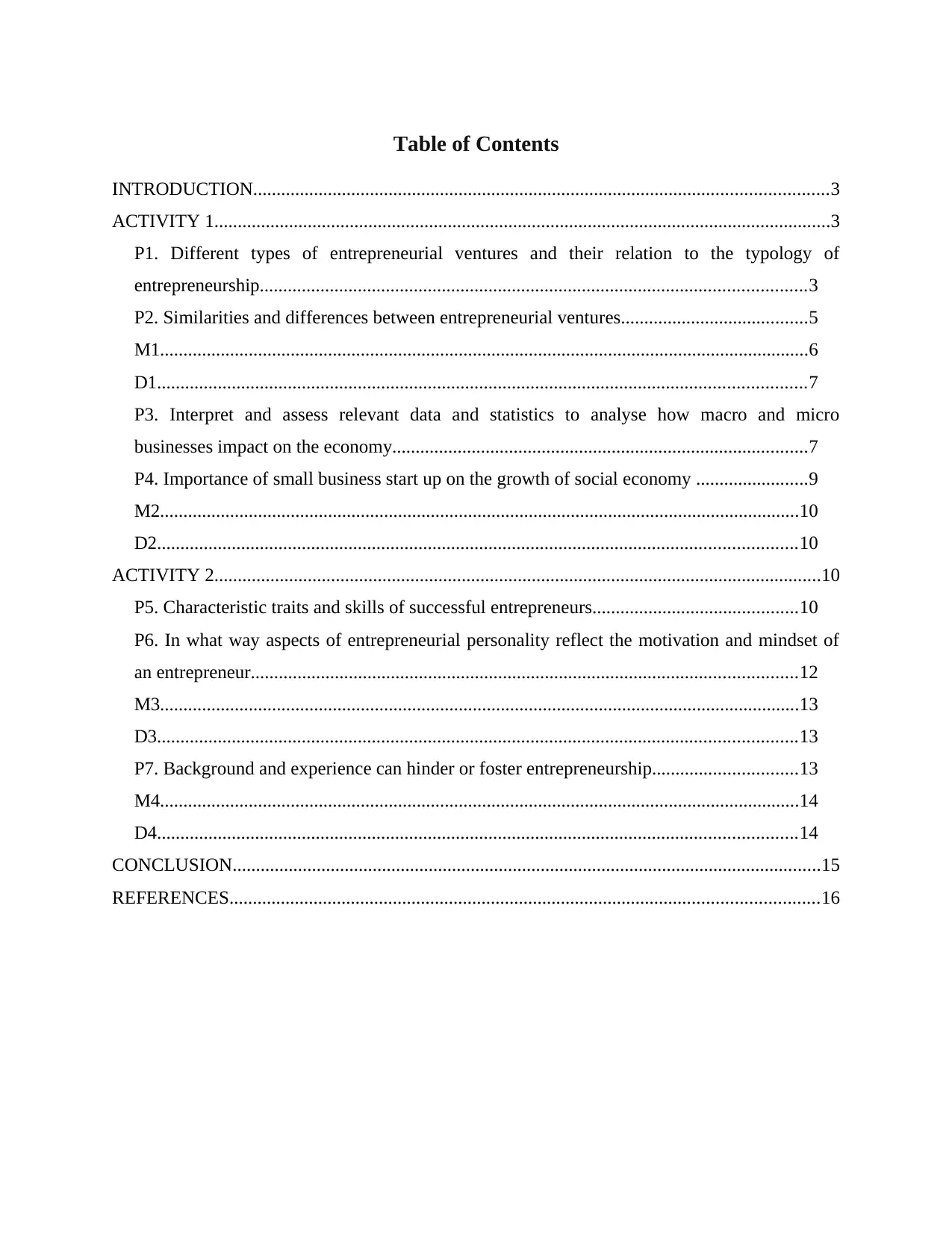
Table of Contents
INTRODUCTION...........................................................................................................................3
ACTIVITY 1....................................................................................................................................3
P1. Different types of entrepreneurial ventures and their relation to the typology of
entrepreneurship.....................................................................................................................3
P2. Similarities and differences between entrepreneurial ventures........................................5
M1...........................................................................................................................................6
D1...........................................................................................................................................7
P3. Interpret and assess relevant data and statistics to analyse how macro and micro
businesses impact on the economy.........................................................................................7
P4. Importance of small business start up on the growth of social economy ........................9
M2.........................................................................................................................................10
D2.........................................................................................................................................10
ACTIVITY 2..................................................................................................................................10
P5. Characteristic traits and skills of successful entrepreneurs............................................10
P6. In what way aspects of entrepreneurial personality reflect the motivation and mindset of
an entrepreneur.....................................................................................................................12
M3.........................................................................................................................................13
D3.........................................................................................................................................13
P7. Background and experience can hinder or foster entrepreneurship...............................13
M4.........................................................................................................................................14
D4.........................................................................................................................................14
CONCLUSION..............................................................................................................................15
REFERENCES..............................................................................................................................16
INTRODUCTION...........................................................................................................................3
ACTIVITY 1....................................................................................................................................3
P1. Different types of entrepreneurial ventures and their relation to the typology of
entrepreneurship.....................................................................................................................3
P2. Similarities and differences between entrepreneurial ventures........................................5
M1...........................................................................................................................................6
D1...........................................................................................................................................7
P3. Interpret and assess relevant data and statistics to analyse how macro and micro
businesses impact on the economy.........................................................................................7
P4. Importance of small business start up on the growth of social economy ........................9
M2.........................................................................................................................................10
D2.........................................................................................................................................10
ACTIVITY 2..................................................................................................................................10
P5. Characteristic traits and skills of successful entrepreneurs............................................10
P6. In what way aspects of entrepreneurial personality reflect the motivation and mindset of
an entrepreneur.....................................................................................................................12
M3.........................................................................................................................................13
D3.........................................................................................................................................13
P7. Background and experience can hinder or foster entrepreneurship...............................13
M4.........................................................................................................................................14
D4.........................................................................................................................................14
CONCLUSION..............................................................................................................................15
REFERENCES..............................................................................................................................16
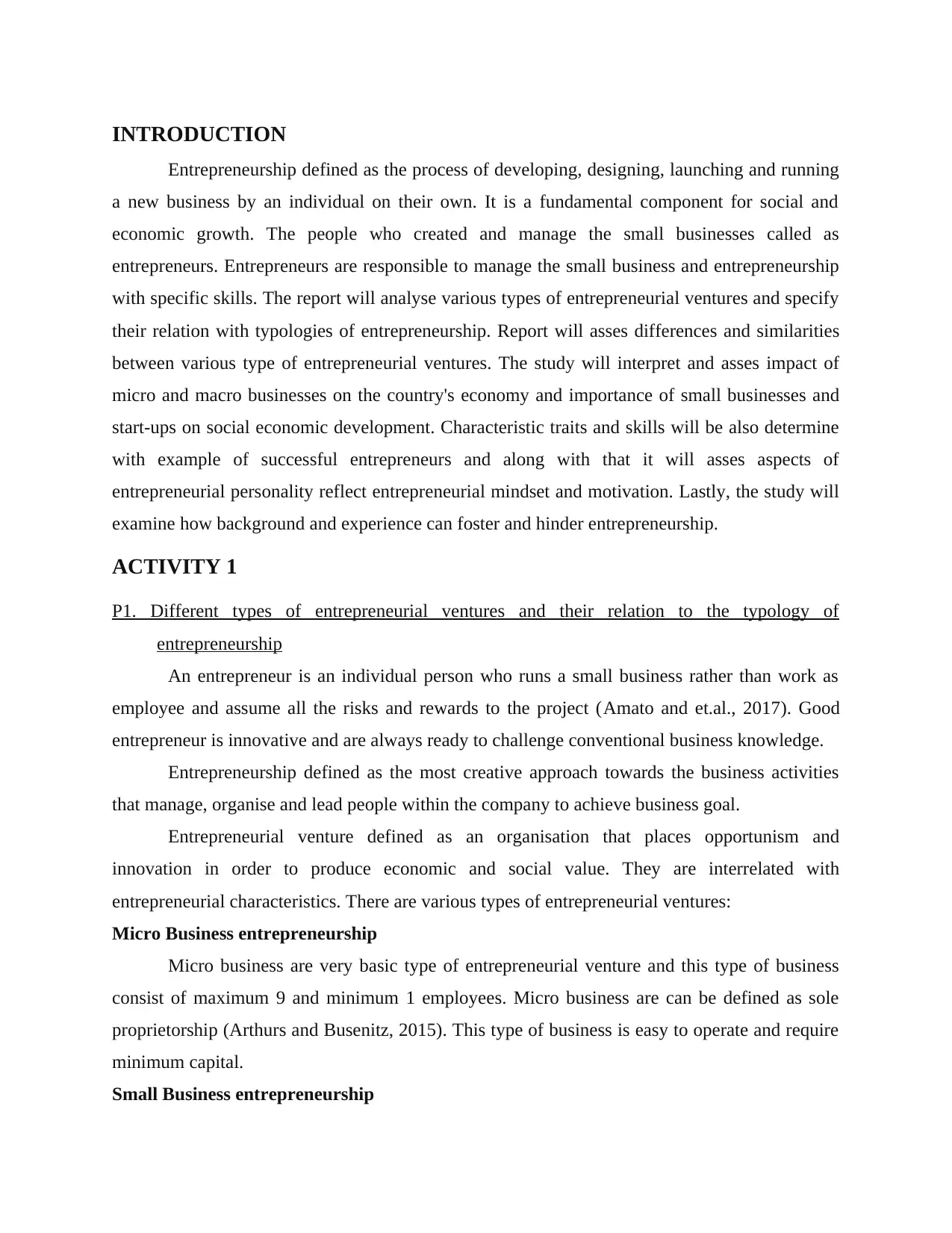
INTRODUCTION
Entrepreneurship defined as the process of developing, designing, launching and running
a new business by an individual on their own. It is a fundamental component for social and
economic growth. The people who created and manage the small businesses called as
entrepreneurs. Entrepreneurs are responsible to manage the small business and entrepreneurship
with specific skills. The report will analyse various types of entrepreneurial ventures and specify
their relation with typologies of entrepreneurship. Report will asses differences and similarities
between various type of entrepreneurial ventures. The study will interpret and asses impact of
micro and macro businesses on the country's economy and importance of small businesses and
start-ups on social economic development. Characteristic traits and skills will be also determine
with example of successful entrepreneurs and along with that it will asses aspects of
entrepreneurial personality reflect entrepreneurial mindset and motivation. Lastly, the study will
examine how background and experience can foster and hinder entrepreneurship.
ACTIVITY 1
P1. Different types of entrepreneurial ventures and their relation to the typology of
entrepreneurship
An entrepreneur is an individual person who runs a small business rather than work as
employee and assume all the risks and rewards to the project (Amato and et.al., 2017). Good
entrepreneur is innovative and are always ready to challenge conventional business knowledge.
Entrepreneurship defined as the most creative approach towards the business activities
that manage, organise and lead people within the company to achieve business goal.
Entrepreneurial venture defined as an organisation that places opportunism and
innovation in order to produce economic and social value. They are interrelated with
entrepreneurial characteristics. There are various types of entrepreneurial ventures:
Micro Business entrepreneurship
Micro business are very basic type of entrepreneurial venture and this type of business
consist of maximum 9 and minimum 1 employees. Micro business are can be defined as sole
proprietorship (Arthurs and Busenitz, 2015). This type of business is easy to operate and require
minimum capital.
Small Business entrepreneurship
Entrepreneurship defined as the process of developing, designing, launching and running
a new business by an individual on their own. It is a fundamental component for social and
economic growth. The people who created and manage the small businesses called as
entrepreneurs. Entrepreneurs are responsible to manage the small business and entrepreneurship
with specific skills. The report will analyse various types of entrepreneurial ventures and specify
their relation with typologies of entrepreneurship. Report will asses differences and similarities
between various type of entrepreneurial ventures. The study will interpret and asses impact of
micro and macro businesses on the country's economy and importance of small businesses and
start-ups on social economic development. Characteristic traits and skills will be also determine
with example of successful entrepreneurs and along with that it will asses aspects of
entrepreneurial personality reflect entrepreneurial mindset and motivation. Lastly, the study will
examine how background and experience can foster and hinder entrepreneurship.
ACTIVITY 1
P1. Different types of entrepreneurial ventures and their relation to the typology of
entrepreneurship
An entrepreneur is an individual person who runs a small business rather than work as
employee and assume all the risks and rewards to the project (Amato and et.al., 2017). Good
entrepreneur is innovative and are always ready to challenge conventional business knowledge.
Entrepreneurship defined as the most creative approach towards the business activities
that manage, organise and lead people within the company to achieve business goal.
Entrepreneurial venture defined as an organisation that places opportunism and
innovation in order to produce economic and social value. They are interrelated with
entrepreneurial characteristics. There are various types of entrepreneurial ventures:
Micro Business entrepreneurship
Micro business are very basic type of entrepreneurial venture and this type of business
consist of maximum 9 and minimum 1 employees. Micro business are can be defined as sole
proprietorship (Arthurs and Busenitz, 2015). This type of business is easy to operate and require
minimum capital.
Small Business entrepreneurship
⊘ This is a preview!⊘
Do you want full access?
Subscribe today to unlock all pages.

Trusted by 1+ million students worldwide
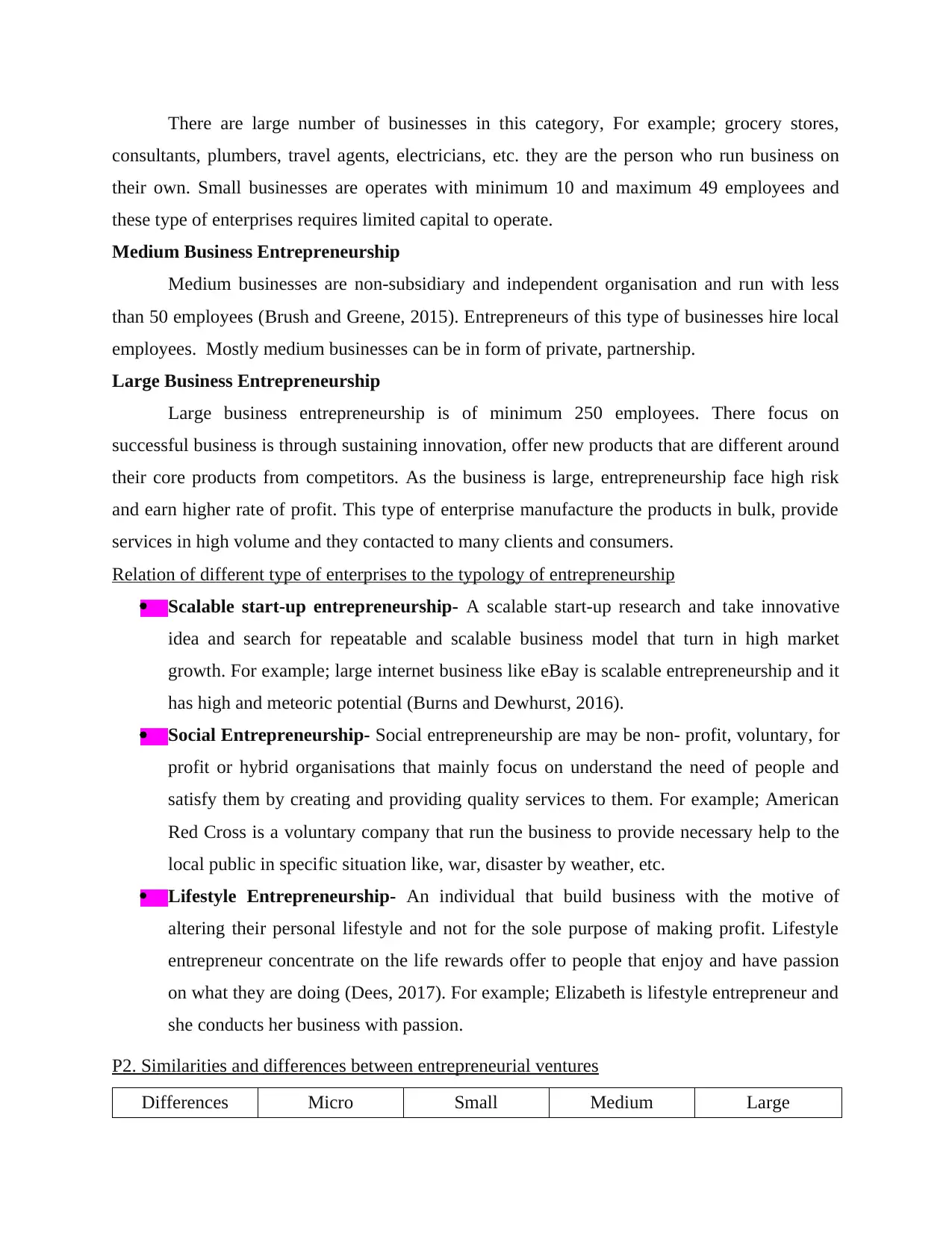
There are large number of businesses in this category, For example; grocery stores,
consultants, plumbers, travel agents, electricians, etc. they are the person who run business on
their own. Small businesses are operates with minimum 10 and maximum 49 employees and
these type of enterprises requires limited capital to operate.
Medium Business Entrepreneurship
Medium businesses are non-subsidiary and independent organisation and run with less
than 50 employees (Brush and Greene, 2015). Entrepreneurs of this type of businesses hire local
employees. Mostly medium businesses can be in form of private, partnership.
Large Business Entrepreneurship
Large business entrepreneurship is of minimum 250 employees. There focus on
successful business is through sustaining innovation, offer new products that are different around
their core products from competitors. As the business is large, entrepreneurship face high risk
and earn higher rate of profit. This type of enterprise manufacture the products in bulk, provide
services in high volume and they contacted to many clients and consumers.
Relation of different type of enterprises to the typology of entrepreneurship
Scalable start-up entrepreneurship- A scalable start-up research and take innovative
idea and search for repeatable and scalable business model that turn in high market
growth. For example; large internet business like eBay is scalable entrepreneurship and it
has high and meteoric potential (Burns and Dewhurst, 2016).
Social Entrepreneurship- Social entrepreneurship are may be non- profit, voluntary, for
profit or hybrid organisations that mainly focus on understand the need of people and
satisfy them by creating and providing quality services to them. For example; American
Red Cross is a voluntary company that run the business to provide necessary help to the
local public in specific situation like, war, disaster by weather, etc.
Lifestyle Entrepreneurship- An individual that build business with the motive of
altering their personal lifestyle and not for the sole purpose of making profit. Lifestyle
entrepreneur concentrate on the life rewards offer to people that enjoy and have passion
on what they are doing (Dees, 2017). For example; Elizabeth is lifestyle entrepreneur and
she conducts her business with passion.
P2. Similarities and differences between entrepreneurial ventures
Differences Micro Small Medium Large
consultants, plumbers, travel agents, electricians, etc. they are the person who run business on
their own. Small businesses are operates with minimum 10 and maximum 49 employees and
these type of enterprises requires limited capital to operate.
Medium Business Entrepreneurship
Medium businesses are non-subsidiary and independent organisation and run with less
than 50 employees (Brush and Greene, 2015). Entrepreneurs of this type of businesses hire local
employees. Mostly medium businesses can be in form of private, partnership.
Large Business Entrepreneurship
Large business entrepreneurship is of minimum 250 employees. There focus on
successful business is through sustaining innovation, offer new products that are different around
their core products from competitors. As the business is large, entrepreneurship face high risk
and earn higher rate of profit. This type of enterprise manufacture the products in bulk, provide
services in high volume and they contacted to many clients and consumers.
Relation of different type of enterprises to the typology of entrepreneurship
Scalable start-up entrepreneurship- A scalable start-up research and take innovative
idea and search for repeatable and scalable business model that turn in high market
growth. For example; large internet business like eBay is scalable entrepreneurship and it
has high and meteoric potential (Burns and Dewhurst, 2016).
Social Entrepreneurship- Social entrepreneurship are may be non- profit, voluntary, for
profit or hybrid organisations that mainly focus on understand the need of people and
satisfy them by creating and providing quality services to them. For example; American
Red Cross is a voluntary company that run the business to provide necessary help to the
local public in specific situation like, war, disaster by weather, etc.
Lifestyle Entrepreneurship- An individual that build business with the motive of
altering their personal lifestyle and not for the sole purpose of making profit. Lifestyle
entrepreneur concentrate on the life rewards offer to people that enjoy and have passion
on what they are doing (Dees, 2017). For example; Elizabeth is lifestyle entrepreneur and
she conducts her business with passion.
P2. Similarities and differences between entrepreneurial ventures
Differences Micro Small Medium Large
Paraphrase This Document
Need a fresh take? Get an instant paraphrase of this document with our AI Paraphraser
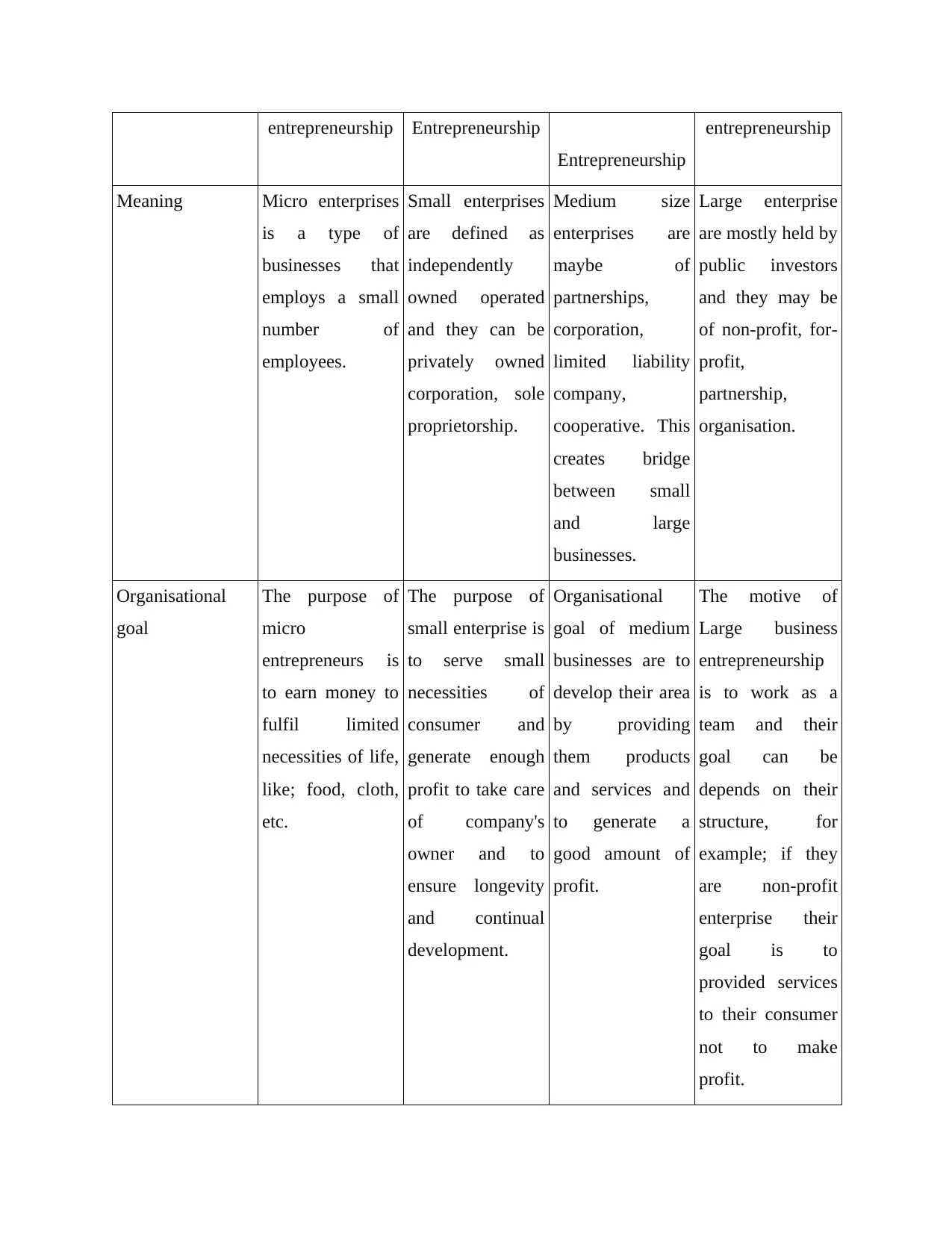
entrepreneurship Entrepreneurship
Entrepreneurship
entrepreneurship
Meaning Micro enterprises
is a type of
businesses that
employs a small
number of
employees.
Small enterprises
are defined as
independently
owned operated
and they can be
privately owned
corporation, sole
proprietorship.
Medium size
enterprises are
maybe of
partnerships,
corporation,
limited liability
company,
cooperative. This
creates bridge
between small
and large
businesses.
Large enterprise
are mostly held by
public investors
and they may be
of non-profit, for-
profit,
partnership,
organisation.
Organisational
goal
The purpose of
micro
entrepreneurs is
to earn money to
fulfil limited
necessities of life,
like; food, cloth,
etc.
The purpose of
small enterprise is
to serve small
necessities of
consumer and
generate enough
profit to take care
of company's
owner and to
ensure longevity
and continual
development.
Organisational
goal of medium
businesses are to
develop their area
by providing
them products
and services and
to generate a
good amount of
profit.
The motive of
Large business
entrepreneurship
is to work as a
team and their
goal can be
depends on their
structure, for
example; if they
are non-profit
enterprise their
goal is to
provided services
to their consumer
not to make
profit.
Entrepreneurship
entrepreneurship
Meaning Micro enterprises
is a type of
businesses that
employs a small
number of
employees.
Small enterprises
are defined as
independently
owned operated
and they can be
privately owned
corporation, sole
proprietorship.
Medium size
enterprises are
maybe of
partnerships,
corporation,
limited liability
company,
cooperative. This
creates bridge
between small
and large
businesses.
Large enterprise
are mostly held by
public investors
and they may be
of non-profit, for-
profit,
partnership,
organisation.
Organisational
goal
The purpose of
micro
entrepreneurs is
to earn money to
fulfil limited
necessities of life,
like; food, cloth,
etc.
The purpose of
small enterprise is
to serve small
necessities of
consumer and
generate enough
profit to take care
of company's
owner and to
ensure longevity
and continual
development.
Organisational
goal of medium
businesses are to
develop their area
by providing
them products
and services and
to generate a
good amount of
profit.
The motive of
Large business
entrepreneurship
is to work as a
team and their
goal can be
depends on their
structure, for
example; if they
are non-profit
enterprise their
goal is to
provided services
to their consumer
not to make
profit.
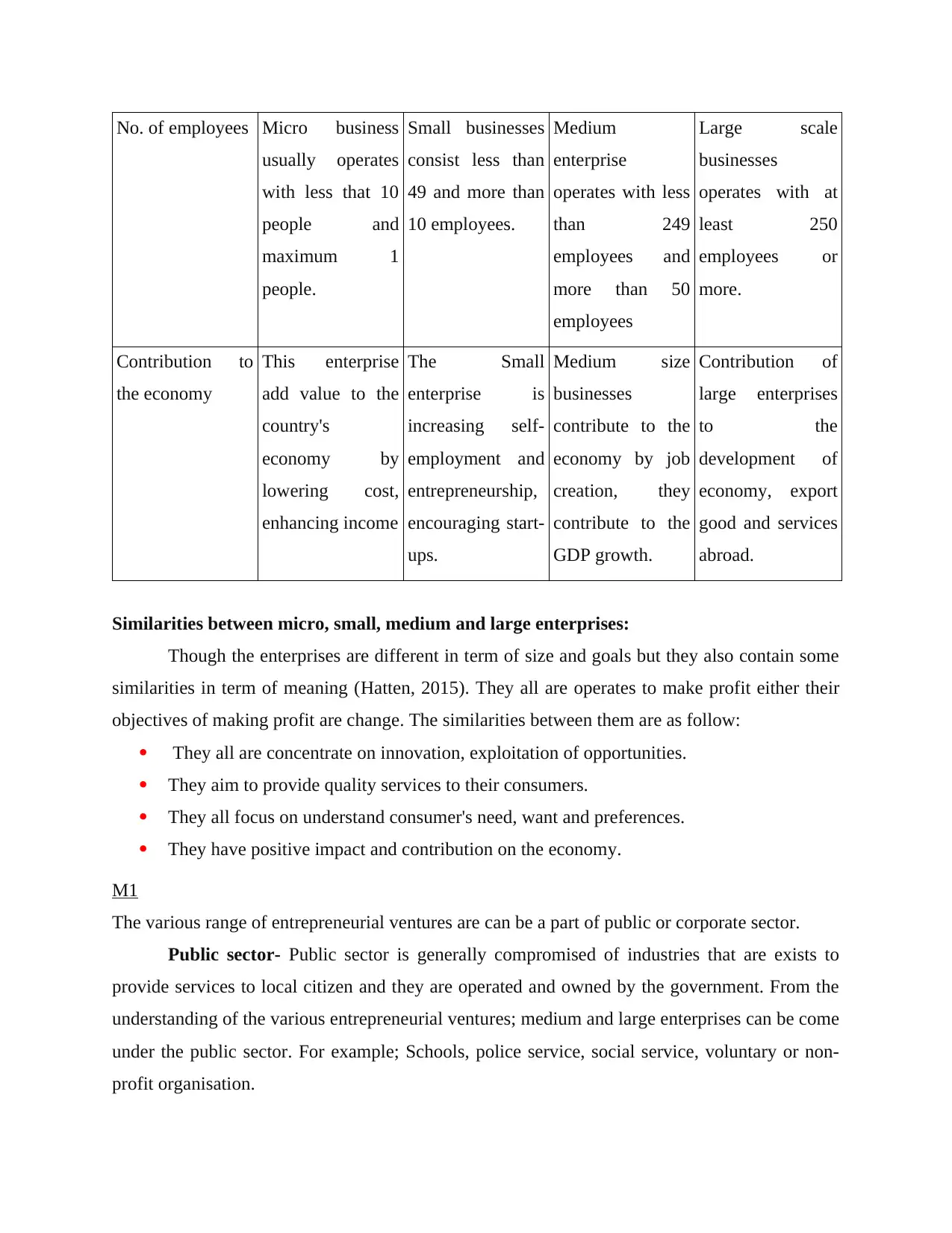
No. of employees Micro business
usually operates
with less that 10
people and
maximum 1
people.
Small businesses
consist less than
49 and more than
10 employees.
Medium
enterprise
operates with less
than 249
employees and
more than 50
employees
Large scale
businesses
operates with at
least 250
employees or
more.
Contribution to
the economy
This enterprise
add value to the
country's
economy by
lowering cost,
enhancing income
The Small
enterprise is
increasing self-
employment and
entrepreneurship,
encouraging start-
ups.
Medium size
businesses
contribute to the
economy by job
creation, they
contribute to the
GDP growth.
Contribution of
large enterprises
to the
development of
economy, export
good and services
abroad.
Similarities between micro, small, medium and large enterprises:
Though the enterprises are different in term of size and goals but they also contain some
similarities in term of meaning (Hatten, 2015). They all are operates to make profit either their
objectives of making profit are change. The similarities between them are as follow:
They all are concentrate on innovation, exploitation of opportunities.
They aim to provide quality services to their consumers.
They all focus on understand consumer's need, want and preferences.
They have positive impact and contribution on the economy.
M1
The various range of entrepreneurial ventures are can be a part of public or corporate sector.
Public sector- Public sector is generally compromised of industries that are exists to
provide services to local citizen and they are operated and owned by the government. From the
understanding of the various entrepreneurial ventures; medium and large enterprises can be come
under the public sector. For example; Schools, police service, social service, voluntary or non-
profit organisation.
usually operates
with less that 10
people and
maximum 1
people.
Small businesses
consist less than
49 and more than
10 employees.
Medium
enterprise
operates with less
than 249
employees and
more than 50
employees
Large scale
businesses
operates with at
least 250
employees or
more.
Contribution to
the economy
This enterprise
add value to the
country's
economy by
lowering cost,
enhancing income
The Small
enterprise is
increasing self-
employment and
entrepreneurship,
encouraging start-
ups.
Medium size
businesses
contribute to the
economy by job
creation, they
contribute to the
GDP growth.
Contribution of
large enterprises
to the
development of
economy, export
good and services
abroad.
Similarities between micro, small, medium and large enterprises:
Though the enterprises are different in term of size and goals but they also contain some
similarities in term of meaning (Hatten, 2015). They all are operates to make profit either their
objectives of making profit are change. The similarities between them are as follow:
They all are concentrate on innovation, exploitation of opportunities.
They aim to provide quality services to their consumers.
They all focus on understand consumer's need, want and preferences.
They have positive impact and contribution on the economy.
M1
The various range of entrepreneurial ventures are can be a part of public or corporate sector.
Public sector- Public sector is generally compromised of industries that are exists to
provide services to local citizen and they are operated and owned by the government. From the
understanding of the various entrepreneurial ventures; medium and large enterprises can be come
under the public sector. For example; Schools, police service, social service, voluntary or non-
profit organisation.
⊘ This is a preview!⊘
Do you want full access?
Subscribe today to unlock all pages.

Trusted by 1+ million students worldwide
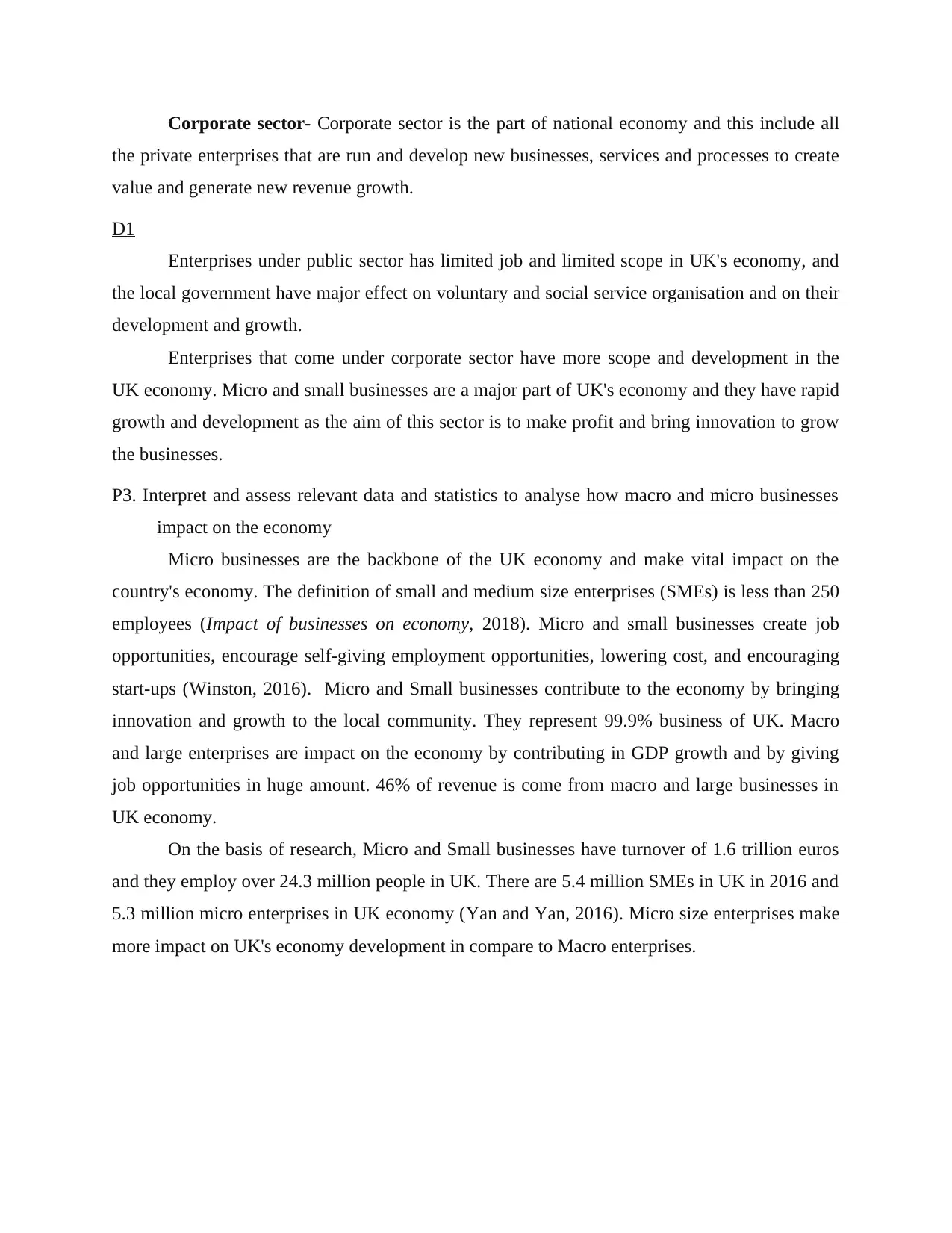
Corporate sector- Corporate sector is the part of national economy and this include all
the private enterprises that are run and develop new businesses, services and processes to create
value and generate new revenue growth.
D1
Enterprises under public sector has limited job and limited scope in UK's economy, and
the local government have major effect on voluntary and social service organisation and on their
development and growth.
Enterprises that come under corporate sector have more scope and development in the
UK economy. Micro and small businesses are a major part of UK's economy and they have rapid
growth and development as the aim of this sector is to make profit and bring innovation to grow
the businesses.
P3. Interpret and assess relevant data and statistics to analyse how macro and micro businesses
impact on the economy
Micro businesses are the backbone of the UK economy and make vital impact on the
country's economy. The definition of small and medium size enterprises (SMEs) is less than 250
employees (Impact of businesses on economy, 2018). Micro and small businesses create job
opportunities, encourage self-giving employment opportunities, lowering cost, and encouraging
start-ups (Winston, 2016). Micro and Small businesses contribute to the economy by bringing
innovation and growth to the local community. They represent 99.9% business of UK. Macro
and large enterprises are impact on the economy by contributing in GDP growth and by giving
job opportunities in huge amount. 46% of revenue is come from macro and large businesses in
UK economy.
On the basis of research, Micro and Small businesses have turnover of 1.6 trillion euros
and they employ over 24.3 million people in UK. There are 5.4 million SMEs in UK in 2016 and
5.3 million micro enterprises in UK economy (Yan and Yan, 2016). Micro size enterprises make
more impact on UK's economy development in compare to Macro enterprises.
the private enterprises that are run and develop new businesses, services and processes to create
value and generate new revenue growth.
D1
Enterprises under public sector has limited job and limited scope in UK's economy, and
the local government have major effect on voluntary and social service organisation and on their
development and growth.
Enterprises that come under corporate sector have more scope and development in the
UK economy. Micro and small businesses are a major part of UK's economy and they have rapid
growth and development as the aim of this sector is to make profit and bring innovation to grow
the businesses.
P3. Interpret and assess relevant data and statistics to analyse how macro and micro businesses
impact on the economy
Micro businesses are the backbone of the UK economy and make vital impact on the
country's economy. The definition of small and medium size enterprises (SMEs) is less than 250
employees (Impact of businesses on economy, 2018). Micro and small businesses create job
opportunities, encourage self-giving employment opportunities, lowering cost, and encouraging
start-ups (Winston, 2016). Micro and Small businesses contribute to the economy by bringing
innovation and growth to the local community. They represent 99.9% business of UK. Macro
and large enterprises are impact on the economy by contributing in GDP growth and by giving
job opportunities in huge amount. 46% of revenue is come from macro and large businesses in
UK economy.
On the basis of research, Micro and Small businesses have turnover of 1.6 trillion euros
and they employ over 24.3 million people in UK. There are 5.4 million SMEs in UK in 2016 and
5.3 million micro enterprises in UK economy (Yan and Yan, 2016). Micro size enterprises make
more impact on UK's economy development in compare to Macro enterprises.
Paraphrase This Document
Need a fresh take? Get an instant paraphrase of this document with our AI Paraphraser
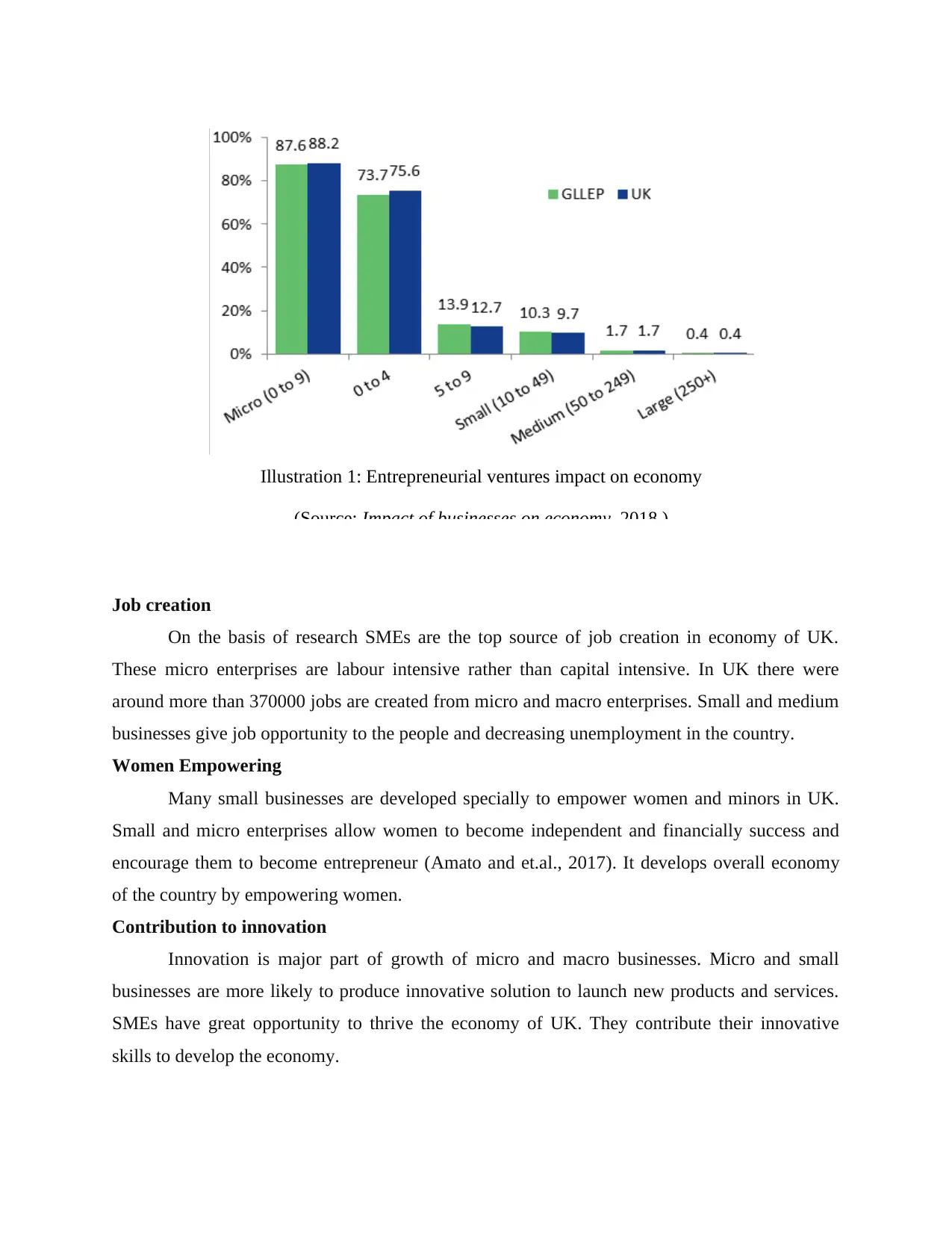
Job creation
On the basis of research SMEs are the top source of job creation in economy of UK.
These micro enterprises are labour intensive rather than capital intensive. In UK there were
around more than 370000 jobs are created from micro and macro enterprises. Small and medium
businesses give job opportunity to the people and decreasing unemployment in the country.
Women Empowering
Many small businesses are developed specially to empower women and minors in UK.
Small and micro enterprises allow women to become independent and financially success and
encourage them to become entrepreneur (Amato and et.al., 2017). It develops overall economy
of the country by empowering women.
Contribution to innovation
Innovation is major part of growth of micro and macro businesses. Micro and small
businesses are more likely to produce innovative solution to launch new products and services.
SMEs have great opportunity to thrive the economy of UK. They contribute their innovative
skills to develop the economy.
Illustration 1: Entrepreneurial ventures impact on economy
(Source: Impact of businesses on economy, 2018 )
On the basis of research SMEs are the top source of job creation in economy of UK.
These micro enterprises are labour intensive rather than capital intensive. In UK there were
around more than 370000 jobs are created from micro and macro enterprises. Small and medium
businesses give job opportunity to the people and decreasing unemployment in the country.
Women Empowering
Many small businesses are developed specially to empower women and minors in UK.
Small and micro enterprises allow women to become independent and financially success and
encourage them to become entrepreneur (Amato and et.al., 2017). It develops overall economy
of the country by empowering women.
Contribution to innovation
Innovation is major part of growth of micro and macro businesses. Micro and small
businesses are more likely to produce innovative solution to launch new products and services.
SMEs have great opportunity to thrive the economy of UK. They contribute their innovative
skills to develop the economy.
Illustration 1: Entrepreneurial ventures impact on economy
(Source: Impact of businesses on economy, 2018 )
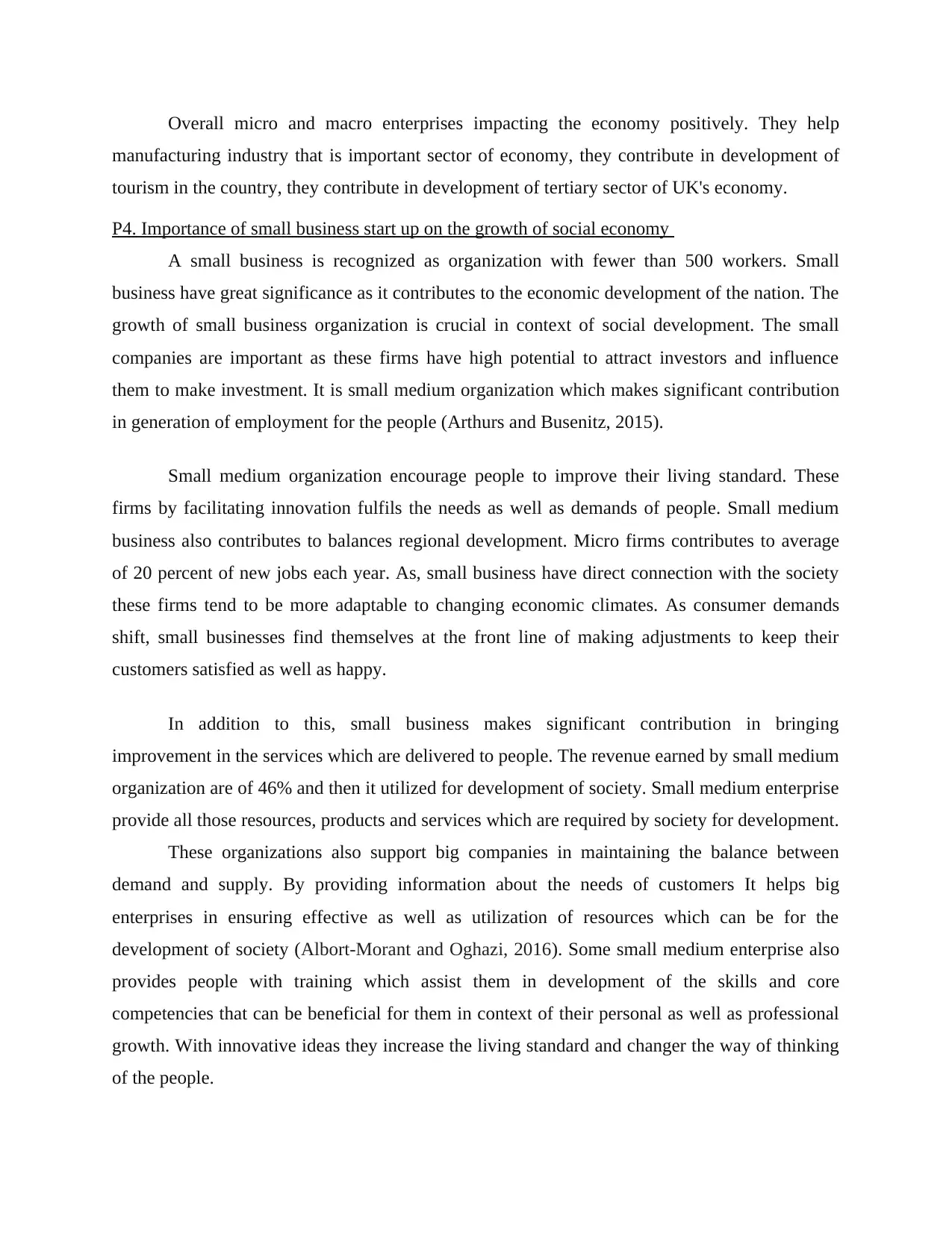
Overall micro and macro enterprises impacting the economy positively. They help
manufacturing industry that is important sector of economy, they contribute in development of
tourism in the country, they contribute in development of tertiary sector of UK's economy.
P4. Importance of small business start up on the growth of social economy
A small business is recognized as organization with fewer than 500 workers. Small
business have great significance as it contributes to the economic development of the nation. The
growth of small business organization is crucial in context of social development. The small
companies are important as these firms have high potential to attract investors and influence
them to make investment. It is small medium organization which makes significant contribution
in generation of employment for the people (Arthurs and Busenitz, 2015).
Small medium organization encourage people to improve their living standard. These
firms by facilitating innovation fulfils the needs as well as demands of people. Small medium
business also contributes to balances regional development. Micro firms contributes to average
of 20 percent of new jobs each year. As, small business have direct connection with the society
these firms tend to be more adaptable to changing economic climates. As consumer demands
shift, small businesses find themselves at the front line of making adjustments to keep their
customers satisfied as well as happy.
In addition to this, small business makes significant contribution in bringing
improvement in the services which are delivered to people. The revenue earned by small medium
organization are of 46% and then it utilized for development of society. Small medium enterprise
provide all those resources, products and services which are required by society for development.
These organizations also support big companies in maintaining the balance between
demand and supply. By providing information about the needs of customers It helps big
enterprises in ensuring effective as well as utilization of resources which can be for the
development of society (Albort-Morant and Oghazi, 2016). Some small medium enterprise also
provides people with training which assist them in development of the skills and core
competencies that can be beneficial for them in context of their personal as well as professional
growth. With innovative ideas they increase the living standard and changer the way of thinking
of the people.
manufacturing industry that is important sector of economy, they contribute in development of
tourism in the country, they contribute in development of tertiary sector of UK's economy.
P4. Importance of small business start up on the growth of social economy
A small business is recognized as organization with fewer than 500 workers. Small
business have great significance as it contributes to the economic development of the nation. The
growth of small business organization is crucial in context of social development. The small
companies are important as these firms have high potential to attract investors and influence
them to make investment. It is small medium organization which makes significant contribution
in generation of employment for the people (Arthurs and Busenitz, 2015).
Small medium organization encourage people to improve their living standard. These
firms by facilitating innovation fulfils the needs as well as demands of people. Small medium
business also contributes to balances regional development. Micro firms contributes to average
of 20 percent of new jobs each year. As, small business have direct connection with the society
these firms tend to be more adaptable to changing economic climates. As consumer demands
shift, small businesses find themselves at the front line of making adjustments to keep their
customers satisfied as well as happy.
In addition to this, small business makes significant contribution in bringing
improvement in the services which are delivered to people. The revenue earned by small medium
organization are of 46% and then it utilized for development of society. Small medium enterprise
provide all those resources, products and services which are required by society for development.
These organizations also support big companies in maintaining the balance between
demand and supply. By providing information about the needs of customers It helps big
enterprises in ensuring effective as well as utilization of resources which can be for the
development of society (Albort-Morant and Oghazi, 2016). Some small medium enterprise also
provides people with training which assist them in development of the skills and core
competencies that can be beneficial for them in context of their personal as well as professional
growth. With innovative ideas they increase the living standard and changer the way of thinking
of the people.
⊘ This is a preview!⊘
Do you want full access?
Subscribe today to unlock all pages.

Trusted by 1+ million students worldwide
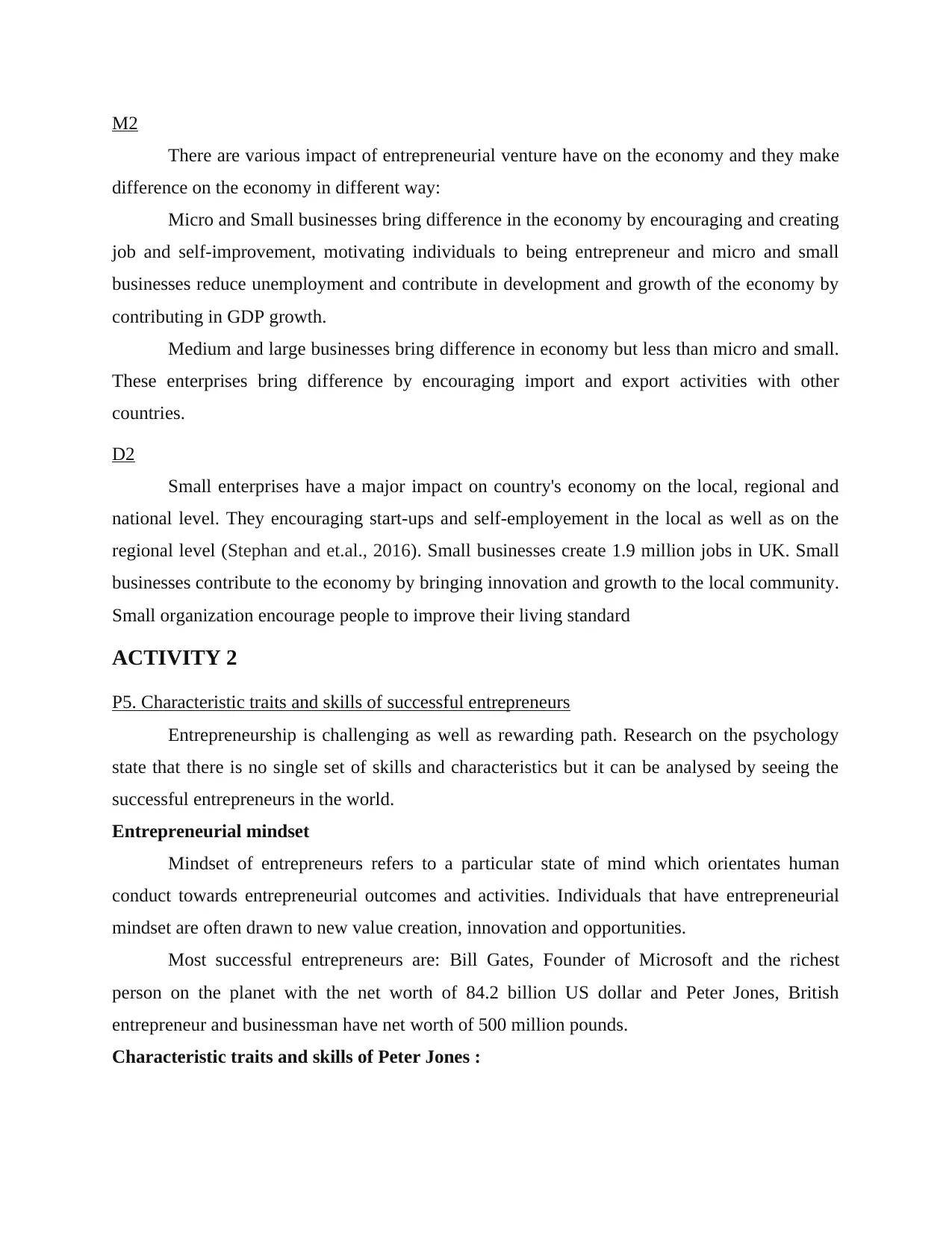
M2
There are various impact of entrepreneurial venture have on the economy and they make
difference on the economy in different way:
Micro and Small businesses bring difference in the economy by encouraging and creating
job and self-improvement, motivating individuals to being entrepreneur and micro and small
businesses reduce unemployment and contribute in development and growth of the economy by
contributing in GDP growth.
Medium and large businesses bring difference in economy but less than micro and small.
These enterprises bring difference by encouraging import and export activities with other
countries.
D2
Small enterprises have a major impact on country's economy on the local, regional and
national level. They encouraging start-ups and self-employement in the local as well as on the
regional level (Stephan and et.al., 2016). Small businesses create 1.9 million jobs in UK. Small
businesses contribute to the economy by bringing innovation and growth to the local community.
Small organization encourage people to improve their living standard
ACTIVITY 2
P5. Characteristic traits and skills of successful entrepreneurs
Entrepreneurship is challenging as well as rewarding path. Research on the psychology
state that there is no single set of skills and characteristics but it can be analysed by seeing the
successful entrepreneurs in the world.
Entrepreneurial mindset
Mindset of entrepreneurs refers to a particular state of mind which orientates human
conduct towards entrepreneurial outcomes and activities. Individuals that have entrepreneurial
mindset are often drawn to new value creation, innovation and opportunities.
Most successful entrepreneurs are: Bill Gates, Founder of Microsoft and the richest
person on the planet with the net worth of 84.2 billion US dollar and Peter Jones, British
entrepreneur and businessman have net worth of 500 million pounds.
Characteristic traits and skills of Peter Jones :
There are various impact of entrepreneurial venture have on the economy and they make
difference on the economy in different way:
Micro and Small businesses bring difference in the economy by encouraging and creating
job and self-improvement, motivating individuals to being entrepreneur and micro and small
businesses reduce unemployment and contribute in development and growth of the economy by
contributing in GDP growth.
Medium and large businesses bring difference in economy but less than micro and small.
These enterprises bring difference by encouraging import and export activities with other
countries.
D2
Small enterprises have a major impact on country's economy on the local, regional and
national level. They encouraging start-ups and self-employement in the local as well as on the
regional level (Stephan and et.al., 2016). Small businesses create 1.9 million jobs in UK. Small
businesses contribute to the economy by bringing innovation and growth to the local community.
Small organization encourage people to improve their living standard
ACTIVITY 2
P5. Characteristic traits and skills of successful entrepreneurs
Entrepreneurship is challenging as well as rewarding path. Research on the psychology
state that there is no single set of skills and characteristics but it can be analysed by seeing the
successful entrepreneurs in the world.
Entrepreneurial mindset
Mindset of entrepreneurs refers to a particular state of mind which orientates human
conduct towards entrepreneurial outcomes and activities. Individuals that have entrepreneurial
mindset are often drawn to new value creation, innovation and opportunities.
Most successful entrepreneurs are: Bill Gates, Founder of Microsoft and the richest
person on the planet with the net worth of 84.2 billion US dollar and Peter Jones, British
entrepreneur and businessman have net worth of 500 million pounds.
Characteristic traits and skills of Peter Jones :
Paraphrase This Document
Need a fresh take? Get an instant paraphrase of this document with our AI Paraphraser
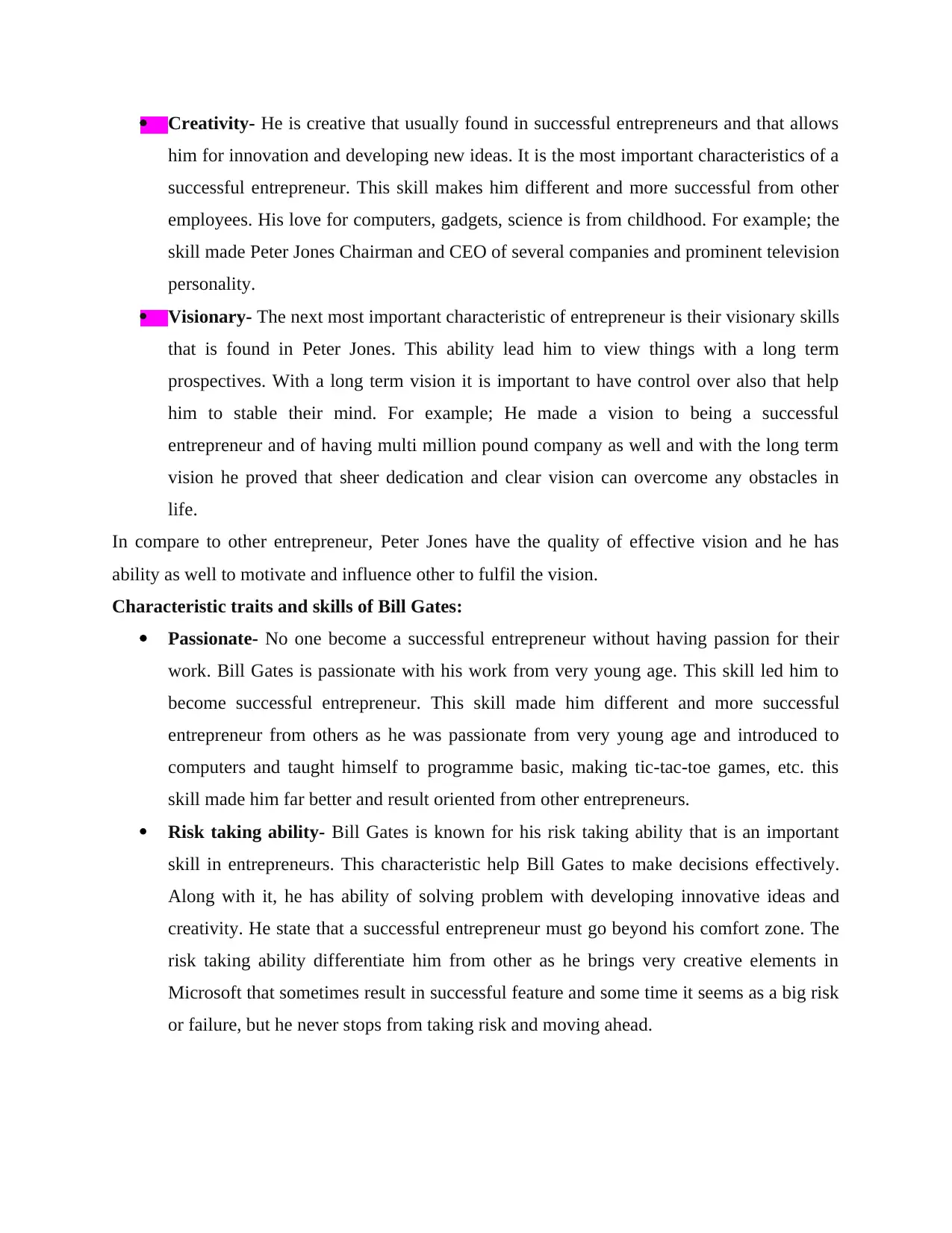
Creativity- He is creative that usually found in successful entrepreneurs and that allows
him for innovation and developing new ideas. It is the most important characteristics of a
successful entrepreneur. This skill makes him different and more successful from other
employees. His love for computers, gadgets, science is from childhood. For example; the
skill made Peter Jones Chairman and CEO of several companies and prominent television
personality.
Visionary- The next most important characteristic of entrepreneur is their visionary skills
that is found in Peter Jones. This ability lead him to view things with a long term
prospectives. With a long term vision it is important to have control over also that help
him to stable their mind. For example; He made a vision to being a successful
entrepreneur and of having multi million pound company as well and with the long term
vision he proved that sheer dedication and clear vision can overcome any obstacles in
life.
In compare to other entrepreneur, Peter Jones have the quality of effective vision and he has
ability as well to motivate and influence other to fulfil the vision.
Characteristic traits and skills of Bill Gates:
Passionate- No one become a successful entrepreneur without having passion for their
work. Bill Gates is passionate with his work from very young age. This skill led him to
become successful entrepreneur. This skill made him different and more successful
entrepreneur from others as he was passionate from very young age and introduced to
computers and taught himself to programme basic, making tic-tac-toe games, etc. this
skill made him far better and result oriented from other entrepreneurs.
Risk taking ability- Bill Gates is known for his risk taking ability that is an important
skill in entrepreneurs. This characteristic help Bill Gates to make decisions effectively.
Along with it, he has ability of solving problem with developing innovative ideas and
creativity. He state that a successful entrepreneur must go beyond his comfort zone. The
risk taking ability differentiate him from other as he brings very creative elements in
Microsoft that sometimes result in successful feature and some time it seems as a big risk
or failure, but he never stops from taking risk and moving ahead.
him for innovation and developing new ideas. It is the most important characteristics of a
successful entrepreneur. This skill makes him different and more successful from other
employees. His love for computers, gadgets, science is from childhood. For example; the
skill made Peter Jones Chairman and CEO of several companies and prominent television
personality.
Visionary- The next most important characteristic of entrepreneur is their visionary skills
that is found in Peter Jones. This ability lead him to view things with a long term
prospectives. With a long term vision it is important to have control over also that help
him to stable their mind. For example; He made a vision to being a successful
entrepreneur and of having multi million pound company as well and with the long term
vision he proved that sheer dedication and clear vision can overcome any obstacles in
life.
In compare to other entrepreneur, Peter Jones have the quality of effective vision and he has
ability as well to motivate and influence other to fulfil the vision.
Characteristic traits and skills of Bill Gates:
Passionate- No one become a successful entrepreneur without having passion for their
work. Bill Gates is passionate with his work from very young age. This skill led him to
become successful entrepreneur. This skill made him different and more successful
entrepreneur from others as he was passionate from very young age and introduced to
computers and taught himself to programme basic, making tic-tac-toe games, etc. this
skill made him far better and result oriented from other entrepreneurs.
Risk taking ability- Bill Gates is known for his risk taking ability that is an important
skill in entrepreneurs. This characteristic help Bill Gates to make decisions effectively.
Along with it, he has ability of solving problem with developing innovative ideas and
creativity. He state that a successful entrepreneur must go beyond his comfort zone. The
risk taking ability differentiate him from other as he brings very creative elements in
Microsoft that sometimes result in successful feature and some time it seems as a big risk
or failure, but he never stops from taking risk and moving ahead.
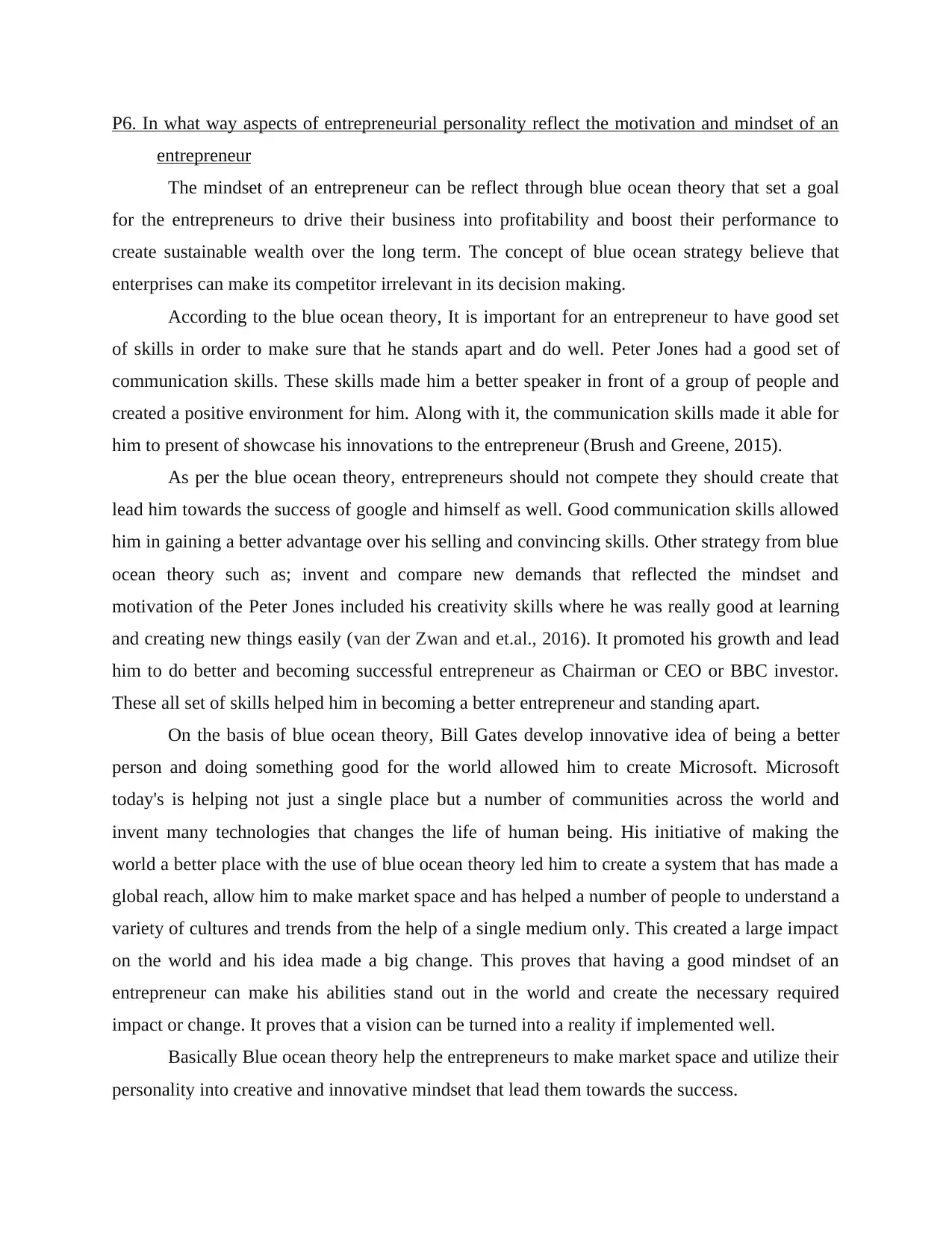
P6. In what way aspects of entrepreneurial personality reflect the motivation and mindset of an
entrepreneur
The mindset of an entrepreneur can be reflect through blue ocean theory that set a goal
for the entrepreneurs to drive their business into profitability and boost their performance to
create sustainable wealth over the long term. The concept of blue ocean strategy believe that
enterprises can make its competitor irrelevant in its decision making.
According to the blue ocean theory, It is important for an entrepreneur to have good set
of skills in order to make sure that he stands apart and do well. Peter Jones had a good set of
communication skills. These skills made him a better speaker in front of a group of people and
created a positive environment for him. Along with it, the communication skills made it able for
him to present of showcase his innovations to the entrepreneur (Brush and Greene, 2015).
As per the blue ocean theory, entrepreneurs should not compete they should create that
lead him towards the success of google and himself as well. Good communication skills allowed
him in gaining a better advantage over his selling and convincing skills. Other strategy from blue
ocean theory such as; invent and compare new demands that reflected the mindset and
motivation of the Peter Jones included his creativity skills where he was really good at learning
and creating new things easily (van der Zwan and et.al., 2016). It promoted his growth and lead
him to do better and becoming successful entrepreneur as Chairman or CEO or BBC investor.
These all set of skills helped him in becoming a better entrepreneur and standing apart.
On the basis of blue ocean theory, Bill Gates develop innovative idea of being a better
person and doing something good for the world allowed him to create Microsoft. Microsoft
today's is helping not just a single place but a number of communities across the world and
invent many technologies that changes the life of human being. His initiative of making the
world a better place with the use of blue ocean theory led him to create a system that has made a
global reach, allow him to make market space and has helped a number of people to understand a
variety of cultures and trends from the help of a single medium only. This created a large impact
on the world and his idea made a big change. This proves that having a good mindset of an
entrepreneur can make his abilities stand out in the world and create the necessary required
impact or change. It proves that a vision can be turned into a reality if implemented well.
Basically Blue ocean theory help the entrepreneurs to make market space and utilize their
personality into creative and innovative mindset that lead them towards the success.
entrepreneur
The mindset of an entrepreneur can be reflect through blue ocean theory that set a goal
for the entrepreneurs to drive their business into profitability and boost their performance to
create sustainable wealth over the long term. The concept of blue ocean strategy believe that
enterprises can make its competitor irrelevant in its decision making.
According to the blue ocean theory, It is important for an entrepreneur to have good set
of skills in order to make sure that he stands apart and do well. Peter Jones had a good set of
communication skills. These skills made him a better speaker in front of a group of people and
created a positive environment for him. Along with it, the communication skills made it able for
him to present of showcase his innovations to the entrepreneur (Brush and Greene, 2015).
As per the blue ocean theory, entrepreneurs should not compete they should create that
lead him towards the success of google and himself as well. Good communication skills allowed
him in gaining a better advantage over his selling and convincing skills. Other strategy from blue
ocean theory such as; invent and compare new demands that reflected the mindset and
motivation of the Peter Jones included his creativity skills where he was really good at learning
and creating new things easily (van der Zwan and et.al., 2016). It promoted his growth and lead
him to do better and becoming successful entrepreneur as Chairman or CEO or BBC investor.
These all set of skills helped him in becoming a better entrepreneur and standing apart.
On the basis of blue ocean theory, Bill Gates develop innovative idea of being a better
person and doing something good for the world allowed him to create Microsoft. Microsoft
today's is helping not just a single place but a number of communities across the world and
invent many technologies that changes the life of human being. His initiative of making the
world a better place with the use of blue ocean theory led him to create a system that has made a
global reach, allow him to make market space and has helped a number of people to understand a
variety of cultures and trends from the help of a single medium only. This created a large impact
on the world and his idea made a big change. This proves that having a good mindset of an
entrepreneur can make his abilities stand out in the world and create the necessary required
impact or change. It proves that a vision can be turned into a reality if implemented well.
Basically Blue ocean theory help the entrepreneurs to make market space and utilize their
personality into creative and innovative mindset that lead them towards the success.
⊘ This is a preview!⊘
Do you want full access?
Subscribe today to unlock all pages.

Trusted by 1+ million students worldwide
1 out of 17
Related Documents
Your All-in-One AI-Powered Toolkit for Academic Success.
+13062052269
info@desklib.com
Available 24*7 on WhatsApp / Email
![[object Object]](/_next/static/media/star-bottom.7253800d.svg)
Unlock your academic potential
Copyright © 2020–2026 A2Z Services. All Rights Reserved. Developed and managed by ZUCOL.





